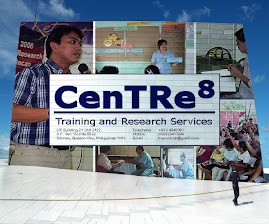In a quick scanning, the answer to this question may be reflected on how some development activists (my purposes of BLOG discussions, we will refer to them as DevActs) view these two concepts: like water and oil - you can put them together yet you cannot form it into a mixture. I encountered a lot of DevActs in my journey towards CSR advocacy. It is quite easy to recognize them for they usually dwell on the following arguments:
- "CSR is both a tool and strategy employed by transnational corporations in order to mask their destructive impacts."
- "These programs are designed to increase their share in their customer's share of heart, which will eventually lead to an increase in their share of wallet."
Based on these points, the DevActs will usually advocate non-support for CSR initiatives, and instead look into genuine community development strategies as the real and lasting solution for poverty, gender-related issues, environmental degradation, and other social issues and concerns. DevActs are usually from the fields of social and natural sciences.
On the other hand, active CSR practitioners (we will refer to them as Corporate Activists or CorpActs) tend to co-opt social/community development concepts for their PR projects, and marketing programs. Through popular media, the CorpActs seem to pay great amounts of lip service to advocate for a new type of community development - the CSR. Based on western-influenced literatures on development, the CorpActs implement grassroots programs (sometimes integrated with "innovative" ideas and proven marketing strategies) with lots of fanfare and media attention. However, in a collective sense, these activities will help fight poverty, preserve the environment, and find solutions to all other emerging social issues and concerns.
But development is not a contest between DevActs and CorpActs!
The real issue is sustainability, patronage politics and cultural hegemony of dole-out mentality. The current trend for most CSR programs are geared towards short-term actions, and dependent on a company's capability to spend for "extra-curricular" activities. The financial allocation for projects are determined by the organization's sales performance. Hence a well-funded project this year may end up without any funding next year. In such a scenario, projects may discontinue. In a company's perspective, this is simply a change in direction.
Short-term efforts, may reflect as great accomplishments for corporations especially when scaled up in numbers. Scanning the impacts of these sporadic programs on the surface may also evoke positive reviews. However, looking deeply into the dynamics of community organizing and grassroots interactions, one may realize that these sporadic projects actually instills patronage politics and a cultural hegemony of dole-out mentality.
This MUST be corrected. The DevActs must begin to realize that attaining development also needs cooperation and acceptance. The fact that the business community is actively moving towards community development through CSR is for real. Accept this and move forward. Without compromising your critical thinking, extend a helping hand and show the way towards an effective participatory development process.
On the other hand, CorpActs must begin to realize that community development through CSR needs to follow a process of participation, acceptance and community action in order to achieve real sustainable development.
There is no conflict between CSR and Community Development. An effective interface will bring synergy that will have lasting positive changes in people's lives.
Alexey Rola Cajilig (alexey.cajilig@gmail.com)



No comments:
Post a Comment